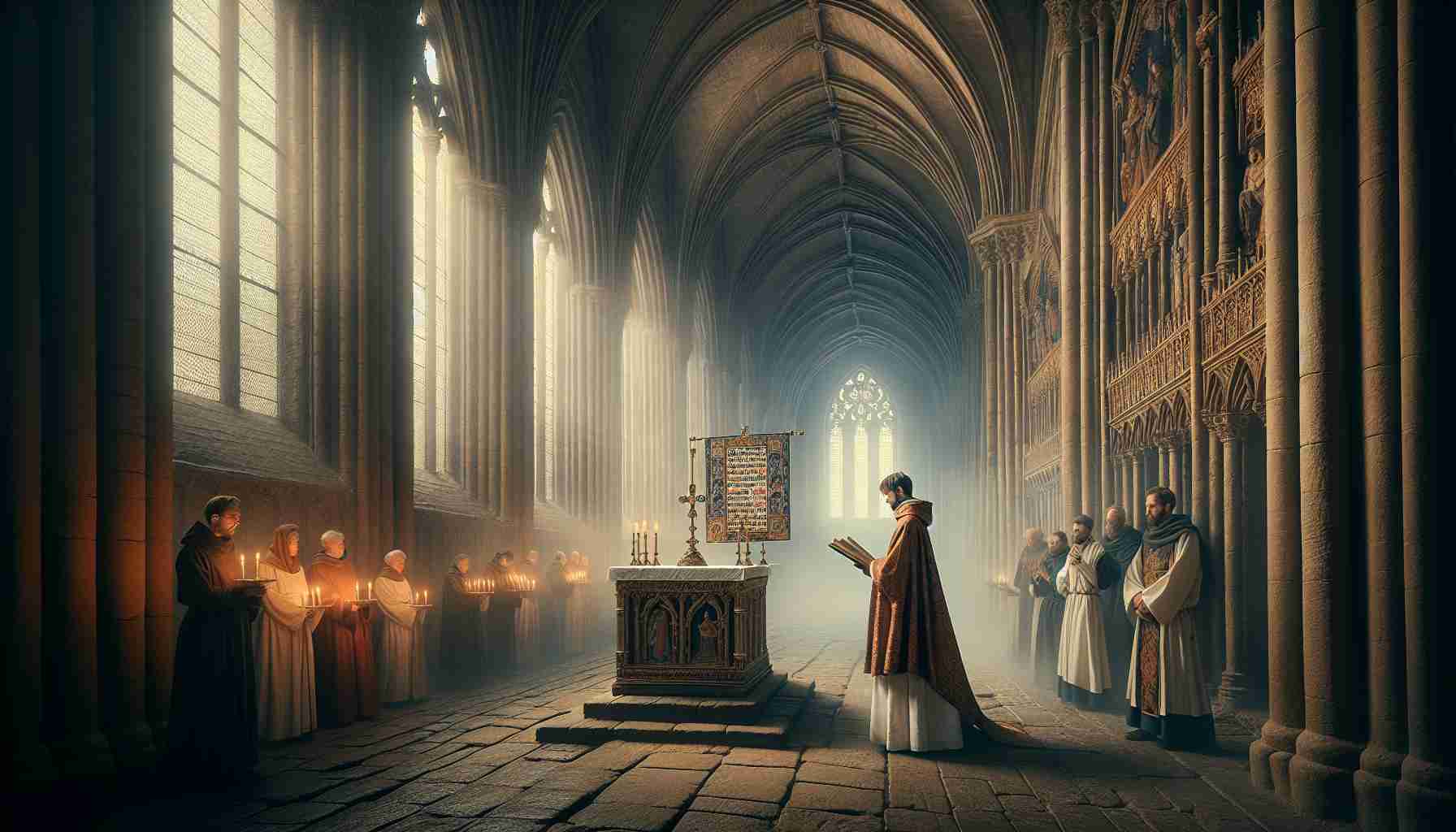

The heavy oaken doors of Westminster Abbey groaned as they swung open, the December wind rushing inside like a whisper of destiny. High above, the early winter sun cast fractured light through narrow lancet windows, filtering golden across limestone columns and rough-hewn stone. Candles guttered in sconces along the nave. Incense hung thick in the air. The crowd trembled—not from the cold, but from the thunder of history about to descend.
It was December 25, 1066. The day of coronation.
A hush fell as Bishop Ealdred lifted his voice in Latin. The ancient rite echoed through the abbey, solemn and eternal: “Let God arise, let His enemies be scattered.” William knelt upon the cold stone, head bowed, heart pounding like hooves on the battlefield he had just survived. His hands, once soaked in English blood at Hastings, rested now on the Holy Gospel.
Beyond the choir screen, Saxon lords and Norman barons shifted uneasily, their loyalties strewn between old gods and new power. The moment was volatile—not all had welcomed a foreign king. Yet amid the tension, William’s mind circled back to Psalm 47:7, which Ealdred had read before dawn, over candlelight: “For God is the King of all the earth; sing praises with understanding.”
Not conquest, but covenant—that would define his reign.
When the crown of Edward the Confessor pressed upon his brow, the shouts of the crowd—“Long live King William!”—broke like thunder. Startled, Norman guards mistook it for rebellion and rushed to arms. Outside, flames licked the thatched roofs of neighboring houses. But inside the abbey, William did not flinch. The smoke of chaos rose like an offering, and he sat enthroned, unmoved, as though held fast by unseen hands. The coronation was sealed in fire, echoing the baptism of rulers in holy flame.
Yet William’s ambition ran deeper than battlefield victories. A devout Catholic educated at the abbey of Bec, he believed reform must follow rule. Just as a shepherd orders his flocks, a king must steward his people, and the church—God’s kingdom on earth—must be its soul.
He dismissed the corrupt Saxon clergy and summoned his trusted guide, Lanfranc of Pavia. The sharp-minded Benedictine, once his teacher, became his Archbishop of Canterbury. Together, they rebuilt the church—not with only stone, but with discipline, faith, and learning. The old wooden churches were replaced by Romanesque marvels: soaring arches, intricately carved capitals, sanctuaries of order and reverence. Abbeys rose from northern beaches to the hills of Wessex, places where monks could chant Psalms and peasants could shelter in God’s house.
Beyond faith, William recognized stewardship. The land was God's gift, and to govern it was sacred duty. In 1086, he commissioned the Domesday Book, a detailed survey of all holdings in England—fields, flocks, households, even swine. Some called it the “Book of Judgement.” None escaped its eye. But William saw in it God’s principle: Nothing is too small to account for; every man’s labor is known to heaven.
In markets and villages from Kent to York, some whispered the Domesday was tyranny. Others murmur still that it was divine clarity—God’s order amid Anglo-Norman chaos.
Under William’s rule, canon law found teeth. Clerical courts were established. Monasteries grew. And though brutal in war, he governed with a vision that God had not abandoned England, but was reshaping it. The violent arc of conquest might yet draw straight beneath heaven.
In private moments—rare as they were—William returned to the Psalms. Psalm 47 again and again soothed the storms in him. “God reigneth over the heathens: God sitteth upon the throne of his holiness.” He believed he had not seized England, but been chosen to tend it, like David plucked from the fields and given a crown.
Only once did he weep before his men—after Lanfranc’s death. The fire of conquest had left many scars upon the land, but losing his friend and confessor withered his spirit. “Who shall speak truth to me now?” he asked.
When death came in 1087, far from Westminster in the scorched lands of Normandy, his body was laid to rest in the Abbey of Saint-Étienne. But even in burial, his reign met disruption. The locals found his tombspace encroached on neighboring property. A poor man stepped forward and cried, “This land is mine!” And so, the monks paid for that patch before the king could be laid to rest.
During the funeral, William’s corpse proved too large for the stone sarcophagus hastily prepared. When forced, it split with a crack, releasing a stench that cleared the abbey. A cruel end, some said. Poetic justice, others mumbled. Yet even in death, William’s story warned of mortal pride and holy purpose intertwined.
Years passed. England’s churches pulsed with chants. Abbots trained boys to read the Latin tongue. The rhythm of sacred liturgy joined the language of kingship. And though William’s sword had cut deep, his faith had planted deeper.
And so Psalm 47 echoes still within walls he fortified, sung in choirs beneath rose windows of Durham and Winchester: “Sing praises with understanding.”
A conqueror he was, but also a servant—crowned not merely by men, but, as he believed, by the God who bends history to His will.